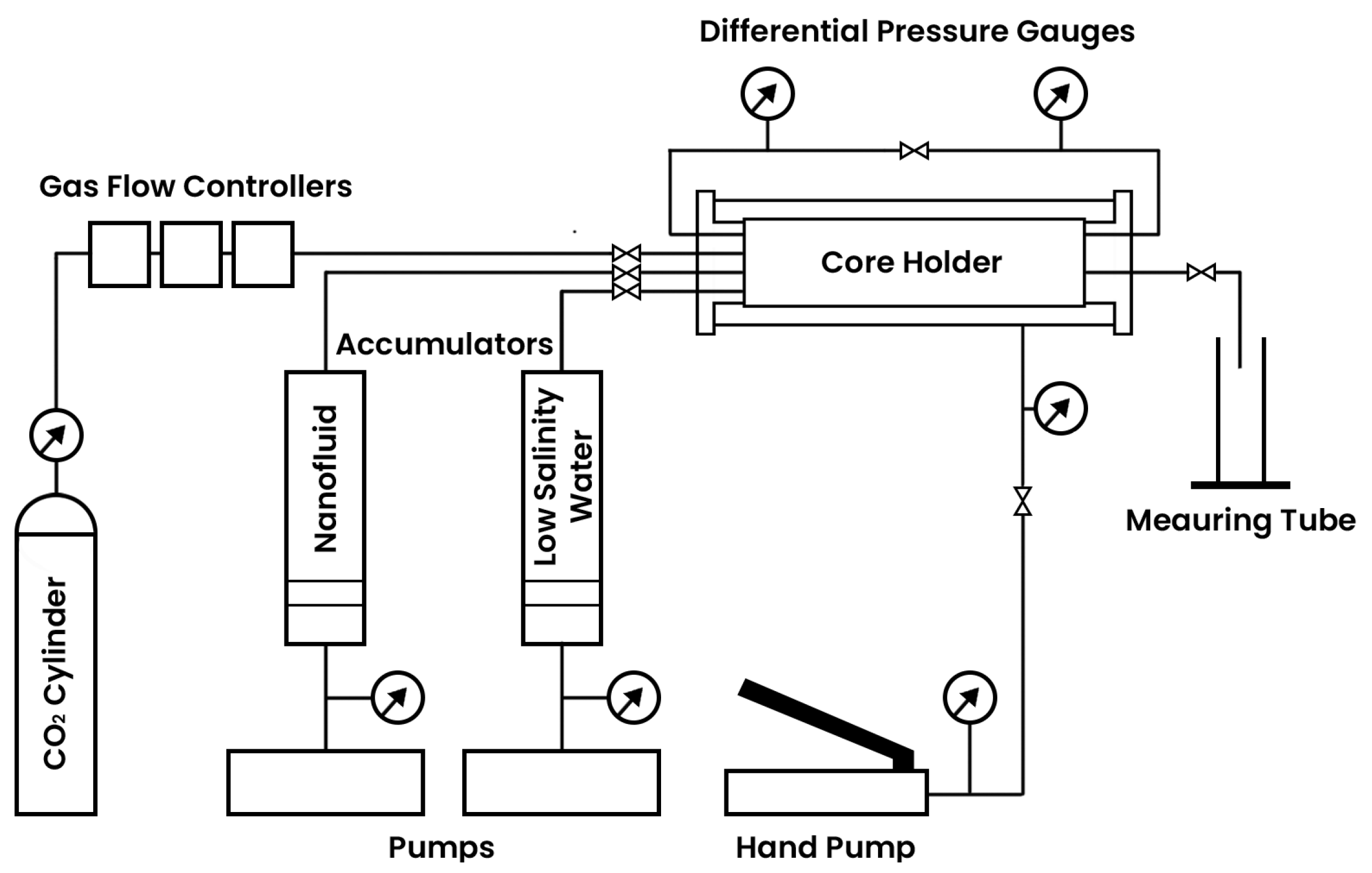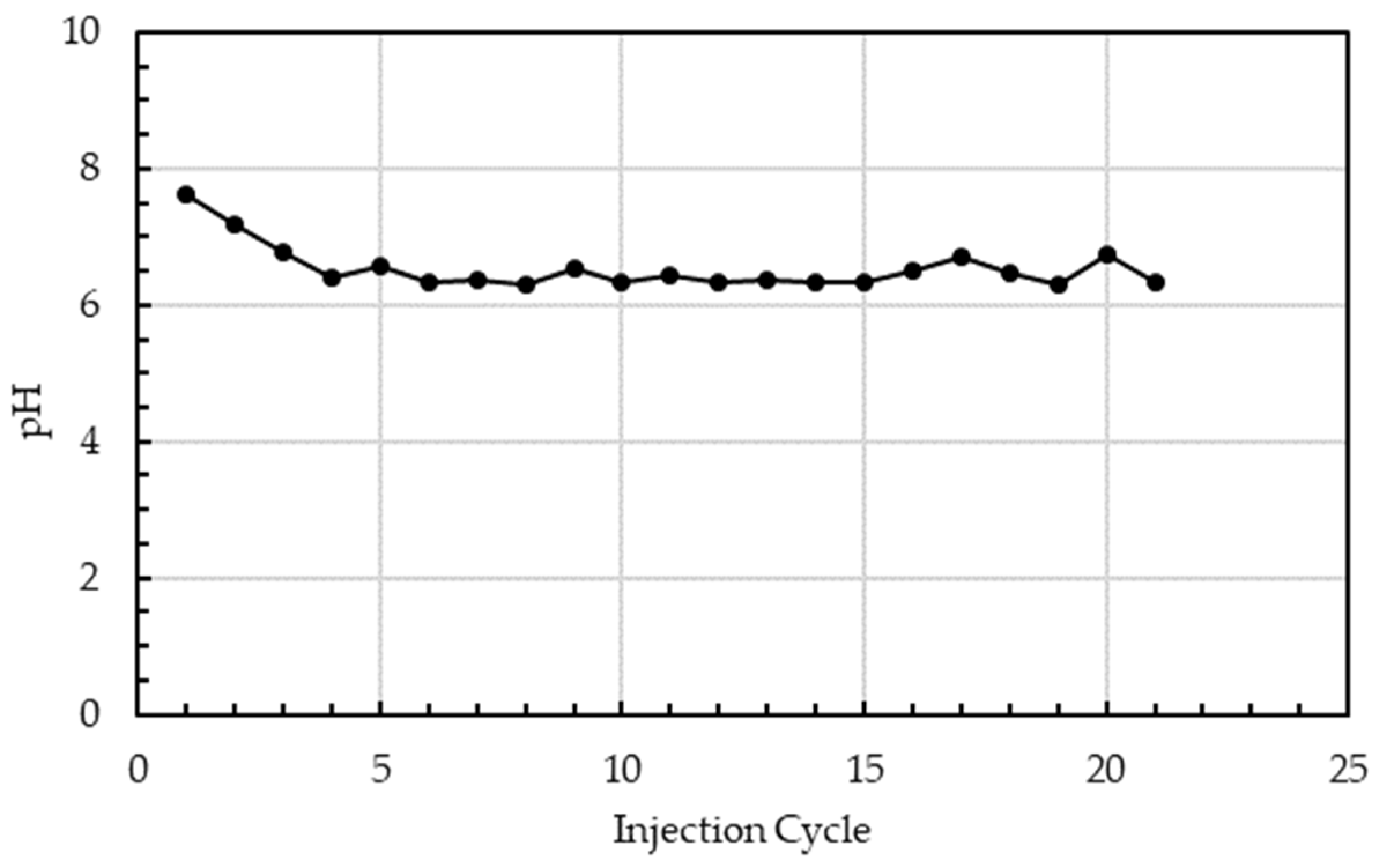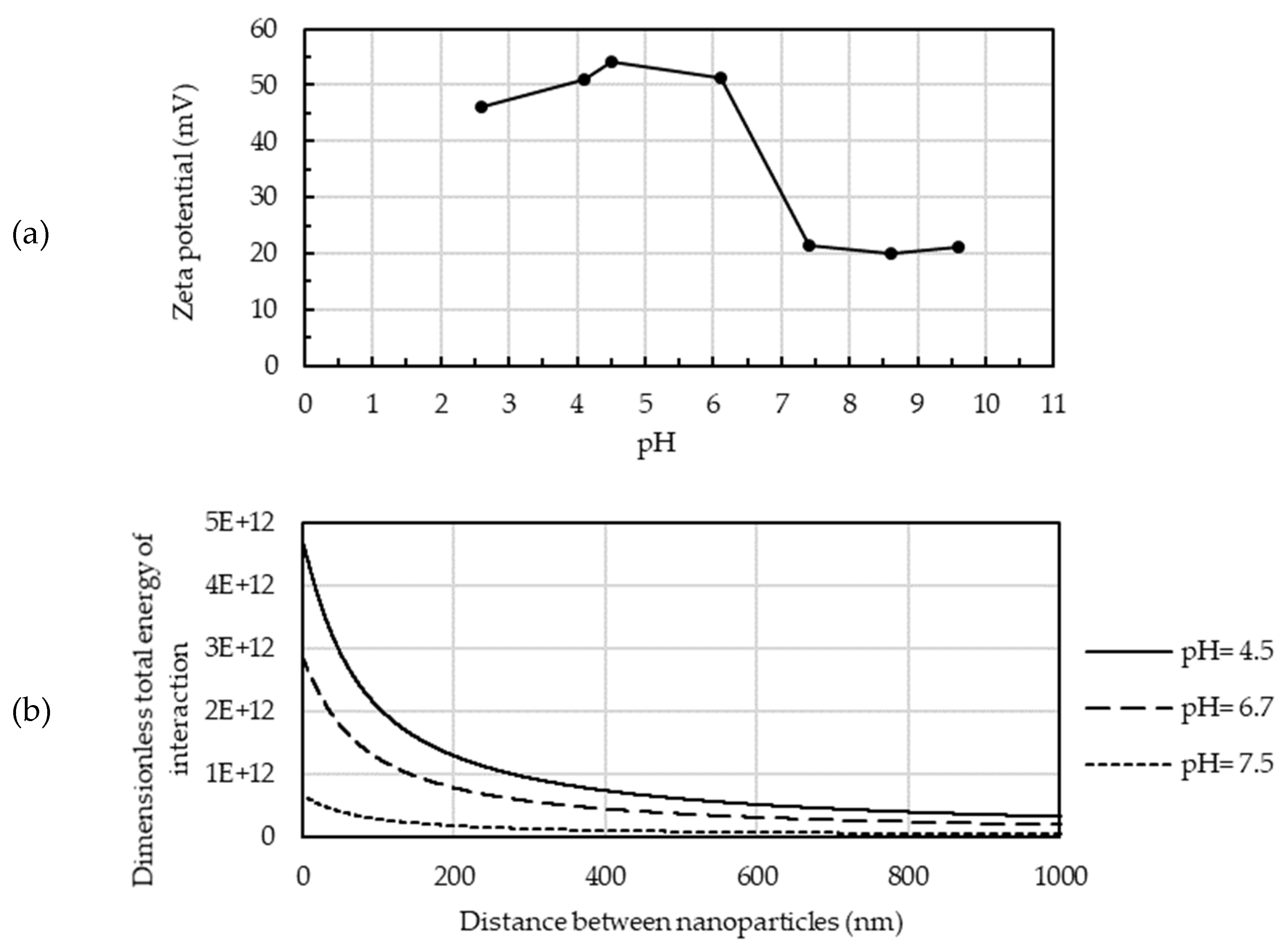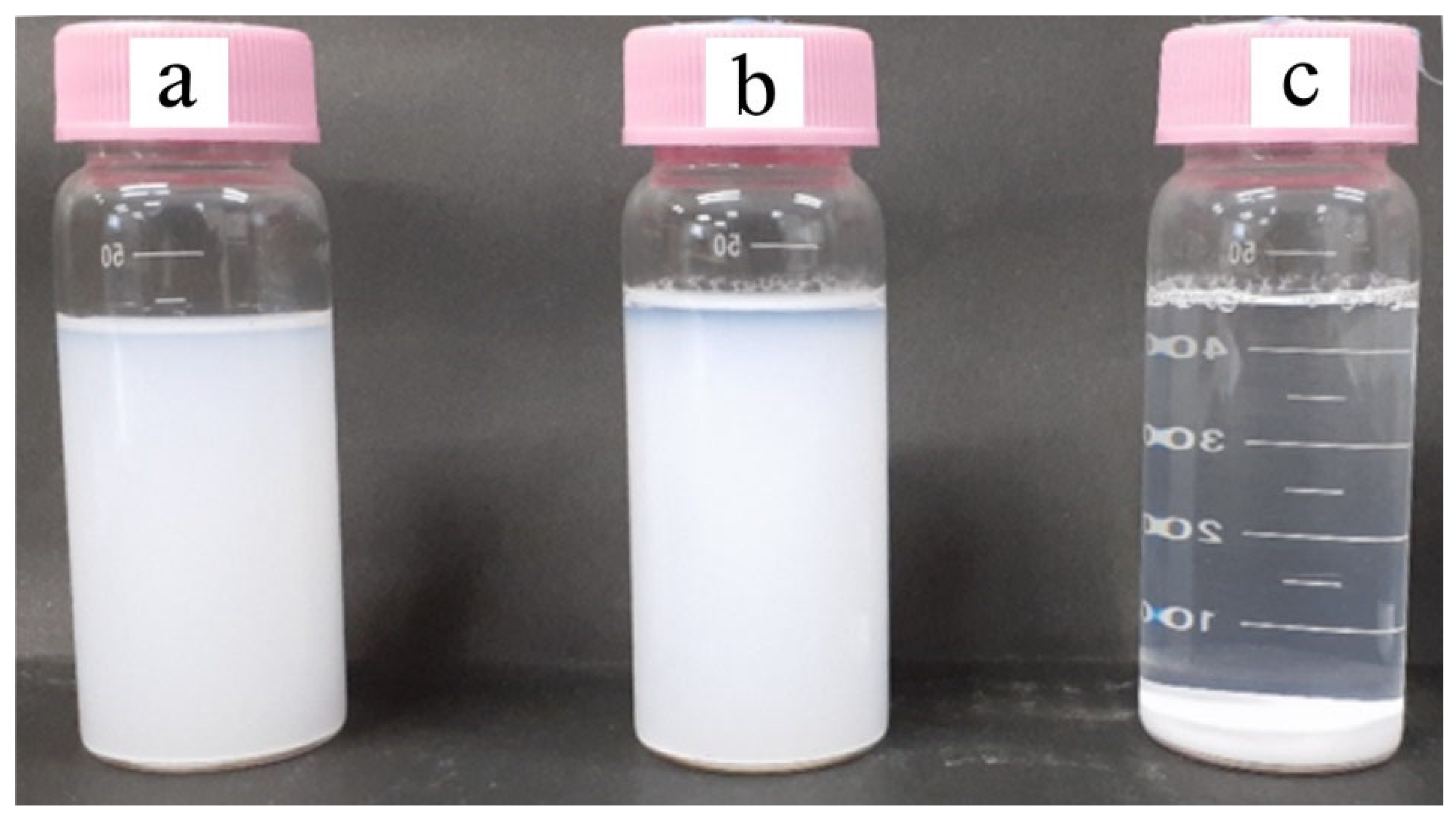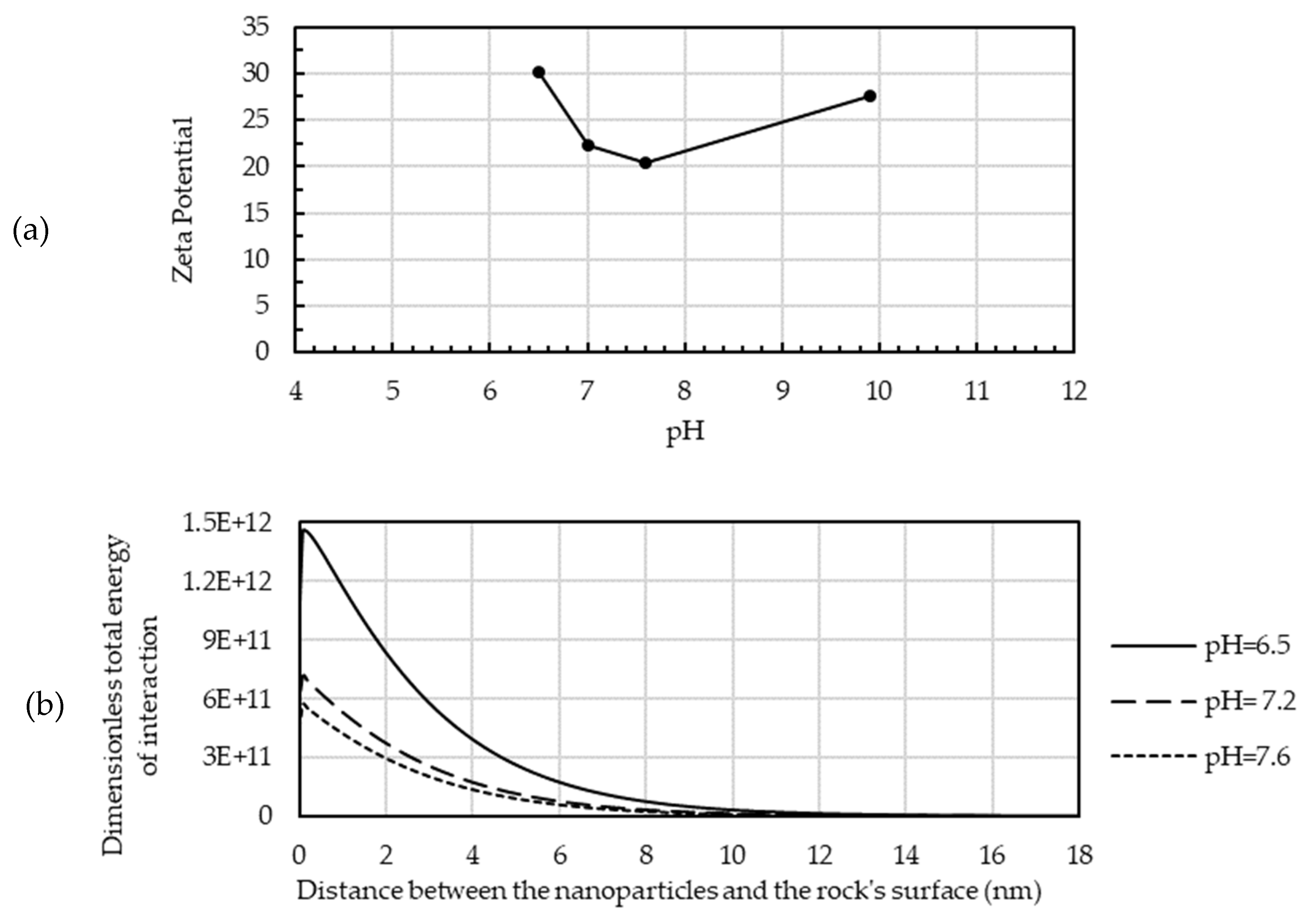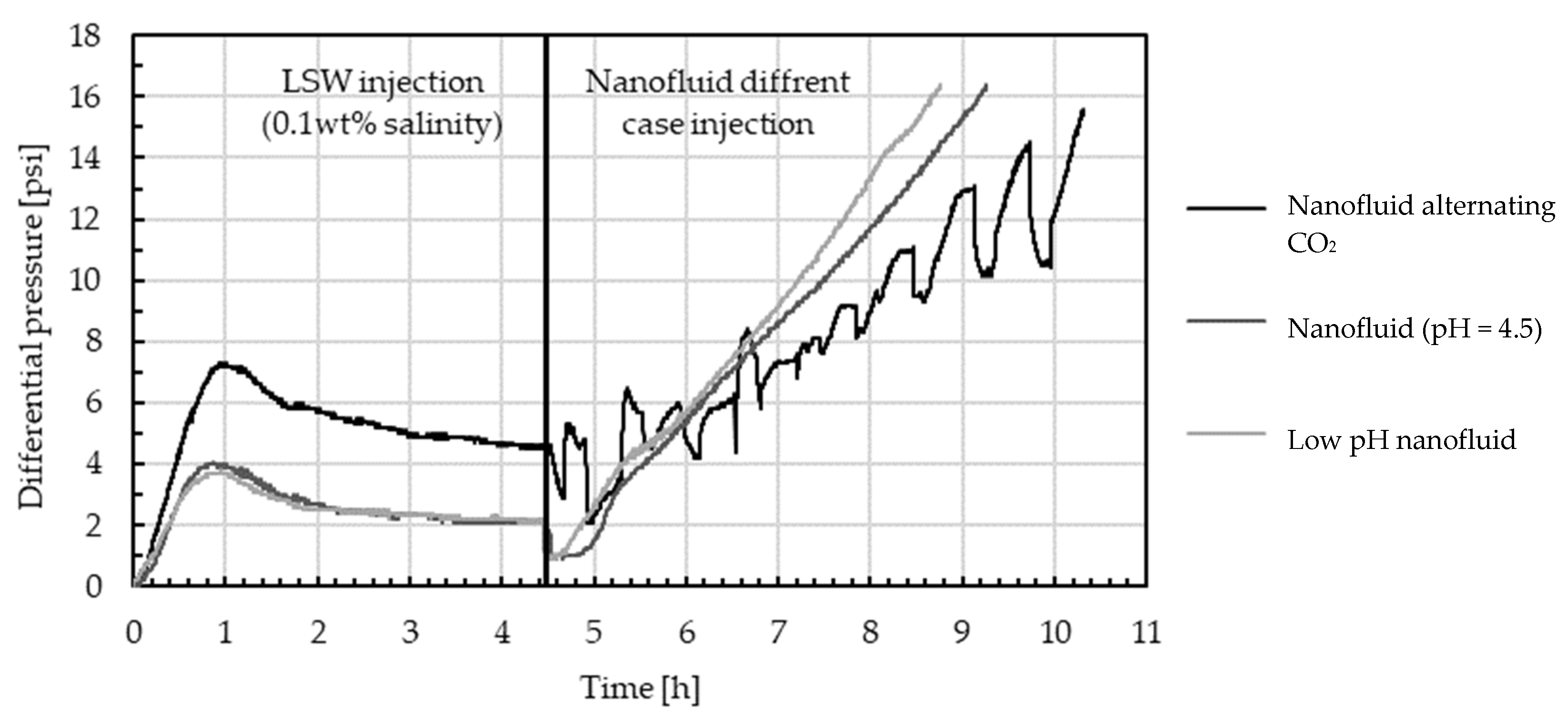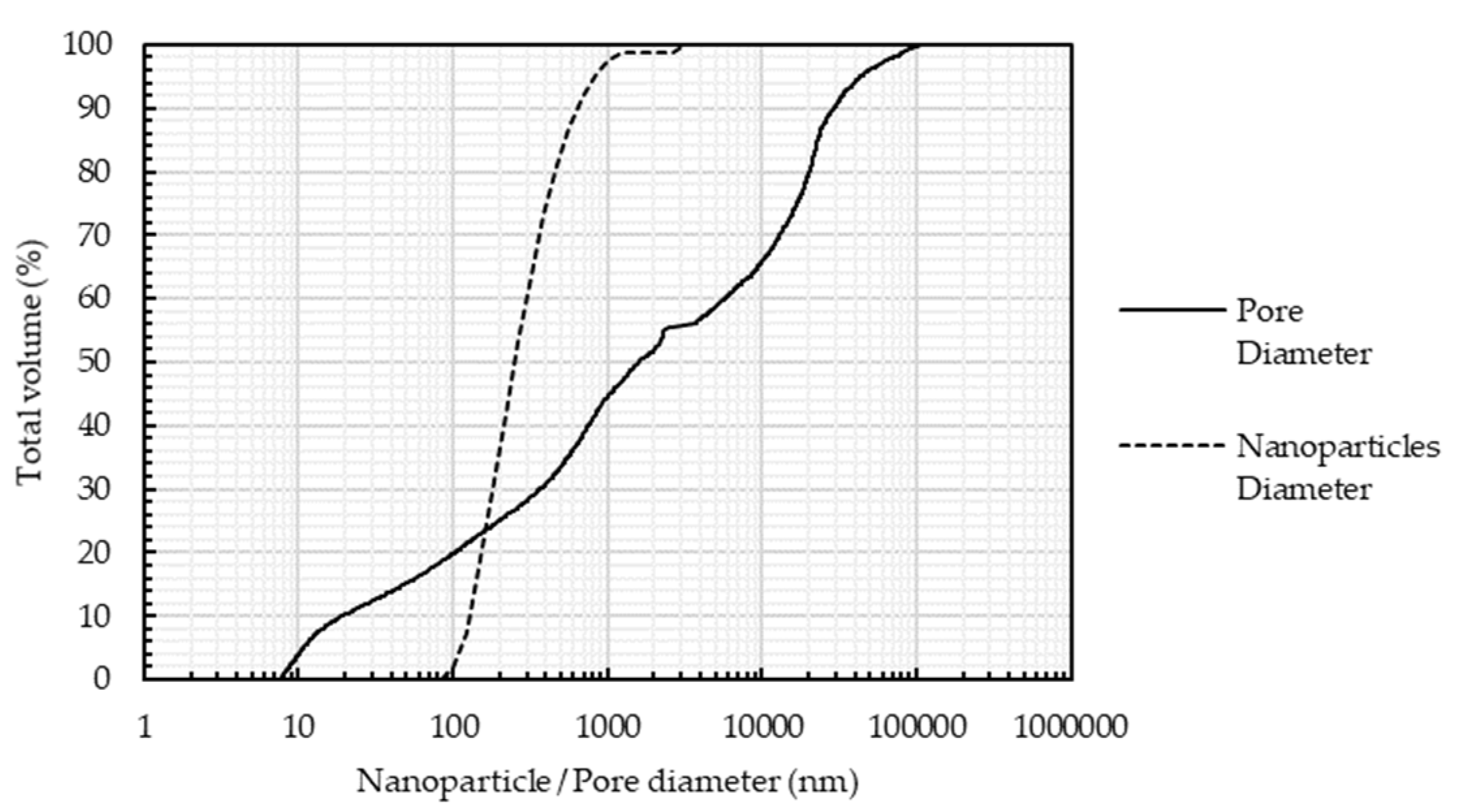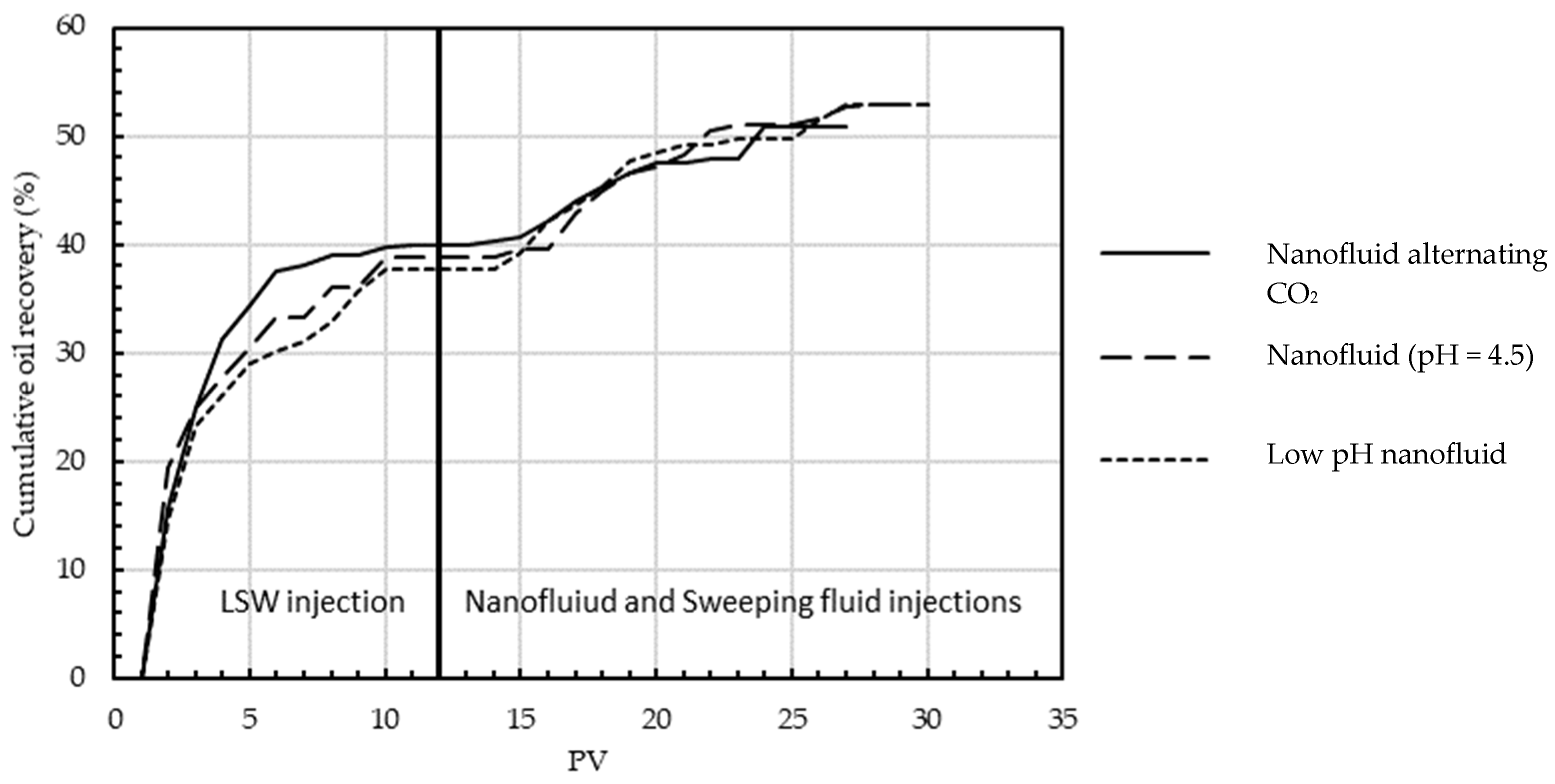1. Introduction
Oil remains a valuable energy resource worldwide. Since the fifties of the twentieth century, oil has been the lifeblood of many industries and will continue to be so for the foreseeable future. In the International Energy Outlook of 2021, the U.S. Energy Information Administration stated that the world’s liquid fuel consumption is expected to increase by nearly 50% by 2050 [
1]. The rise in energy consumption necessitates maximization of oil production from available reservoirs. Therefore, enhanced oil recovery is a critical topic of research.
Nanofluids are nanoscale colloidal solutions prepared by dispersing nanoparticles (solid phase) in a base fluid (liquid phase) [
2]. Using nanoparticles for enhanced oil recovery is an economically viable [
3] and promising method that has proven its potential in laboratory experiments [
4,
5,
6]. One of the major advantages of nanoparticles enhanced oil recovery is the multitude of mechanisms involved in the recovery process. These mechanisms include wettability alteration [
6,
7,
8,
9], interfacial tension reduction [
10,
11], disjoining pressure [
12,
13,
14], and pore plugging [
14,
15]. However, applying this method on a large scale remains challenging because of its immaturity compared with other enhanced oil recovery methods, environmental effects of this method, and performance uncertainty in large-scale reservoirs [
16]. Improving the performance uncertainty issue requires maximizing the performance of nanoparticles for enhanced oil recovery. Several factors, such as nanofluid stability [
14], nanoparticles type, and its compatibility with the reservoir’s type and conditions, affect the performance of nanoparticles during enhanced oil recovery. [
16,
17].
After nanofluid injection in the reservoir, nanoparticles can get retained in the rock’s pore space, close pore channels, and cause permeability damage [
10,
11,
14,
15,
17,
18]. Permeability damage is typically expressed as a percentage of reduction from the rock’s original permeability (before nanofluid injection). Permeability damage indicates poor performance for the nanoparticles enhanced oil recovery, and pH control is typically used to enhance nanofluid performance [
16].
Nanoparticle retention typically occurs through three mechanisms during the nanofluid injection process [
19]. First, the sedimentation of nanoparticles resulting from instability [
2,
19]. Second, physical entrapment (filtration), which occurs when nanoparticles are larger than some of the pore throats or when the surface of the pores exhibits a rough geometry [
2,
10,
19]. Third, the adsorption of nanoparticles onto the rock surface when the total potential energy between the nanoparticles and the rock surface is attractive [
2,
19]. Some retention of nanoparticles can be beneficial for diverting the flow of injected fluids toward unproduced oil and for altering the wettability of the rock surface. However, too much retention can be counterintuitive, detrimental to the efficiency of nanofluids, and could impede the oil recovery process [
14,
15].
Altering the pH of both the nanofluid, and the medium it is injected into changes stability and total interaction energy between the nanoparticles and the rock surface [
2,
20]. The stability of the nanofluid refers to the nanofluid’s resistance to agglomeration and sedimentation. Therefore, more stable nanofluids exhibit superior performance. Stability can be explained using the Derjaguin, Landau, Verwey, and Overbeek (DLVO) theory. According to this theory, gravity and buoyancy forces are ignored, and the stability of the nanofluid depends only on the total interaction energy between nanoparticles. The total energy is the sum of Van der Waals attractive force and electrical double layer repulsive force [
2]. Numerous factors, including nanoparticles’ size and concentration, the dielectric constant of the base fluid, and zeta potential of the nanoparticles affect the total potential energy between the nanoparticles [
2,
20] and affect nanofluid stability.
The pH value of the nanofluid and its zeta potential are correlated [
2,
21]. When a material is submerged in an electrolyte solution, it is usually charged because of the adsorption of ions on the material’s surface, or ionization of dissociable surface groups. Ions that determine the material’s surface charge are called potential-determining ions or PDIs [
21]. As mentioned, the zeta potential affects the total interaction energy and causes the pH control method to affect the performance of nanofluids and permeability damage.
The pH condition for less retention and permeability damage should satisfy the following two conditions:
Not satisfying these conditions eventually results in an attractive total potential energy that results in low nanofluid stability and high adsorption of nanoparticles on the rock surface.
A large number of research studies related to using nanoparticles in the oil and gas industry have focused on silicon dioxide (SiO
2) nanoparticles [
4,
5]. However, other types of commercially available nanoparticles have promising potentials. Among these types is aluminum oxide (Al
2O
3) nanoparticles, which have proven to be effective for enhanced oil recovery applications [
5,
6,
10]. However, similar to the other types of nanoparticles, Al
2O
3 nanoparticles tend to cause permeability damage. In the case of Al
2O
3 nanoparticles, changing the pH of the base fluid (increasing or decreasing the concentration of H
+ ions) changes the surface charge and zeta potential, as displayed in
Figure 1 [
22], which changes stability and interaction energy between Al
2O
3 nanoparticles and the rock surface.
This study experimentally investigated the efficiency of the pH control method for reducing the permeability damage caused by the injection of Al
2O
3 nanofluids. The study involved performing core flooding experiments at various pH conditions and comparing permeability damage results. DLVO theory calculations, scanning electron microscopy (SEM), and energy dispersive X-ray (EDX) analysis were performed to confirm and evaluate nanoparticle retention. Limestone was used in the study because according to a study by Bayat et al., the positive surface potential of limestone renders it compatible with the positively charged Al
2O
3 nanoparticles [
10].
3. Results and Discussion
3.1. Zeta Potential and Stability
The zeta potential measurements of α-Al
2O
3 nanoparticles in the nanofluid are displayed in
Figure 4a. According to the DLVO theory, higher zeta potential results in higher repulsion between nanoparticles. Therefore, the nanofluid exhibits high stability. The dimensionless total potential energy of the interaction between the nanoparticles was calculated using equations 1 to 4 [
2,
26], and the results are presented in
Figure 4b.
 |
(3) |
where
VT,
VVDW,
VEDL and
VTD are the total energy of interaction, Van der Waals attractive force, electrical double layer repulsive force, and the dimensionless total energy of interaction, respectively,
is the Hamaker constant for Al
2O
3 nanoparticle–nanoparticle interaction (5.3 × 10
-20) [
17],
is the separation distance between nanoparticles
,
is nanoparticle’s radius
,
is the relative dielectric constant of the base fluid (78.5 for water) [
17],
is the permittivity of the free space (8.85 × 10
-12 C/V/m),
is the zeta potential of nanoparticles
,
is the Boltzmann constant (1.3805 × 10
-23 J/°K) [
17],
is the temperature of the system (295°K), and ??? is the Debye reciprocal length
.
The nanoparticles had the highest zeta potential at a pH value of 4.5. DLVO calculations revealed that the interaction between nanoparticles was repulsive in all cases. However, a notable increase in nanoparticles’ repulsion occurred when pH was decreased and zeta potential increased. These results are reflected in
Figure 5, where a sedimentation test at 4.5, 6.7, and 7.5 pH conditions revealed the same trend. The highest stability was achieved at a pH of 4.5.
Because of the relation between Van der Waals attractive force and the distance between the nanoparticles, when nanoparticles collide with each other, they form clusters that are inseparable unless subjected to strong agitation. This clustering behavior is detrimental to nanofluid stability. According to DLVO theory, the electrical double layer force is the only force acting against the clustering of nanoparticles. The electrical double layer force had a positive correlation with zeta potential, which increased at lower pH conditions, explaining the stability results.
3.2. Limestone Permeability Damage
pH within the limestone core was assumed to be the average of all effluents’ pH values. In all cases, the pH of the effluent was measured immediately after the injection of each pore volume to avoid equilibrium between the dissolved CO
2 and air. After conducting the core flooding experiments, cleaning the cores, and measuring the new permeability of each core, permeability damage was calculated as the permeability’s reduction percentage. The permeability damage and pH results are presented in
Table 3.
The total interaction energy between nanoparticles and the rock surface was calculated according to DLVO theory using equations 1, and 4 to 7. In this case, the equations of
and
differ considerably because of the interaction being a sphere-plate interaction instead of a sphere-sphere interaction as in the case of nanoparticles’ interactions [
20]. The results are presented in
Figure 6.
 |
(7) |
where
and
are the zeta potentials of the nanoparticles and the rock surface, respectively (mV).
The results revealed that permeability reduction occurred in all cases. However, the nanofluid alternating CO
2 injection case resulted in the least permeability damage. As displayed in
Figure 4,
Figure 5 and
Figure 6, lower pH conditions resulted in stronger repulsion between the nanoparticles themselves, and between nanoparticles and the rock surface. The stronger repulsion in those cases resulted in less retention of nanoparticles because sedimentation and adsorption are two of the main nanoparticles’ retention mechanisms. Therefore, the lower permeability damage when nanofluid was alternately injected with the CO
2 was attributed to the lower pH condition within the core.
Despite the lower pH condition in the nanofluid alternating CO
2 injection core flooding experiment (IDLS_1), it was not sufficient to completely prevent the continuous accumulation of nanoparticles after injection into each pore volume of nanofluid. In all experiments, the differential pressure increased during the nanofluid injection step, as displayed in
Figure 7. This increase proved that the pore-plugging effect occurred in all experiments. Nevertheless, in the nanofluid alternating CO
2 injection experiment, the plugging effect occurred at a slower rate. This conclusion was based on the slower rise in the differential pressure compared with those in other experiments.
In the second core flooding experiment (IDLS_2), the nanofluid was injected without alternating gas, the pH value within the core was high. This phenomenon resulted in unstable nanofluid and weak repulsion between the nanoparticles and the rock surface. Eventually, permeability damage was the highest.
In the final core flooding experiment (IDLS_3), the low-pH nanofluid had a pH value of 2.8 after increasing the concentration of the hydrochloric acid. The dissolution of calcite was proportional to the concentration of H
+ at pH values lower than 4 in aqueous solutions [
27]. Therefore, lowering the pH of the water-based nanofluid resulted in a higher dissolution of calcite, which not only increased the pH within the core but also resulted in an increased amount of calcium chloride (CaCl
2). A higher concentration of CaCl
2 is detrimental to the stability of α-Al
2O
3 nanoparticles because the increased concentration of Cl
- anions bridge the positively charged alumina nanoparticles. This effect creates larger nanoparticle clusters and lowers nanofluid stability [
28]. However, the higher dissolution of calcite was not completely negative in the low-pH nanofluid injection experiment because it mitigated some permeability damage of nanoparticles’ sedimentation.
3.3. Permeability Damage Mechanisms
Permeability damage was high in all cases regardless of the pH value. Investigation of the causes revealed the following conclusions:
Although the nanofluid was stable in the low-pH case, some sedimentation of nanoparticles occurred, but not as much as in the other experiments in which sedimentation was high. In all experiments, sedimentation contributed to the retention of nanoparticles inside cores.
The average cluster size of the nanoparticles at a pH of 4.5 was approximately 250 nm, and at a pH of 2.8, the average cluster size was 290 nm. The smallest size was 250 nm and was achieved using the ball milling method. However, the size was not sufficiently small to not cause permeability damage. The pore size distribution of a limestone core similar to the cores used in the experiments was used to obtain an approximate difference between the pore size and the nanoparticles’ size. As depicted in
Figure 8, approximately 20% of the pores were too small for the smallest nanoparticles, and another 5% of the pores were too small for 25% of the nanoparticles. This case excluded the agglomeration occurring inside the core during the injection process, which rendered the retention through straining more impactful on permeability.
The roughness of the pore surface considerably influences the retention of nanoparticles inside the pores. The nanoparticles tend to get into the dents of the rough surface because of Brownian motion or repulsion between them. However, the repulsion between the nanoparticles and pore surface is only effective at a short distance, as displayed in
Figure 6b, and that distance is shorter than the depth of the rough surface’s dents. The surface roughness was investigated using SEM images, and the resulting images of the pores’ surfaces are displayed in
Figure 9. The images revealed that the surface of the pores was rough in general, but it had some smooth surfaces. Some pore channels were rough on one side and smooth on the other side.
The pores’ surface was mostly covered with irregular bumps and dents, which hindered the flow of nanoparticles and resulted in higher retention and permeability damage to the core. This phenomenon was confirmed by obtaining SEM pictures and EDX analysis of a thin section from the inlet area of the IDLS_2 core after the core flooding experiment.
Figure 10a displays the EDX analysis that confirmed the nanoparticles’ retention in
Figure 10b, and
Figure 10c shows another example of retention within the rough dents of the limestone surface.
In addition to sedimentation, forms of the physical entrapment of nanoparticles are a major cause of permeability damage. The pH had a limited effect on these mechanisms, which caused all injection cases to have considerably high permeability damage, even at lower pH values. The result of this study indicated that altering pH through CO2 gas injection positively affects permeability damage, but pH does not affect some retention mechanisms. Therefore, pH should be considered as one of several other factors that should be considered when using the α-Al2O3 nanofluid for enhanced oil recovery in limestones.
Oil Recovery
Oil recovery was slightly higher in the experiments that did not involve CO
2 injection, as displayed in
Figure 11 and
Table 4. Higher recovery occurred during the second and third steps of core flooding processes and could be attributed to pore blocking, disjoining pressure, wettability alteration, and interfacial tension reduction. The cores used in the experiments had high permeability. In such cases, the flow of the injected fluids tended to move from the inlet to the outlet through the widest channel. This phenomenon left oil droplets in the smaller pore channels unproduced, especially as the cores were oil wet. This phenomenon was observed at the end of the LSW flooding when the oil stopped being produced and the differential pressure almost stabilized as previously displayed in
Figure 7.
When nanofluid injection was initiated, the pore-plugging effect of the nanoparticles occurred after a few PV, which caused the nanofluid to flow into the pores in which oil was trapped. This phenomenon was evident by the increase in the differential pressure and absence of oil in the effluent during the first few PV. The attachment and spreading of nanoparticles onto the pore surface allowed the nanoparticles to exert disjoining pressure on oil droplets, separating them from the rock surface. The attachment of nanoparticles also alters the wettability of the calcite from oil wet to intermediate wet. The wettability alteration test result is displayed in
Figure 12, and it is consistent with the results of Bayat et al. [
10]. Finally, interfacial tension reduction effectively increased oil recovery because of the presence of both CTAB surfactant and Al
2O
3 nanoparticles themselves.
In experiments with greater permeability damage, more nanoparticles were retained in the core, and more nanoparticles spread on the surface, which enhanced the pore plugging, disjoining pressure, and wettability alteration effects. Therefore, oil recovery was enhanced in the cases in which permeability damage was higher.
4. Conclusions
In this study, the effects of pH control using CO2 on the retention of α-Al2O3 nanoparticles and limestone permeability damage were investigated. The results revealed that CO2 gas injection with the α-Al2O3 nanofluid caused lower permeability damage to the limestone cores than cases that did not include CO2 gas. This phenomenon could be attributed to the lower pH condition after the formation of H2CO3, which resulted in a stronger positive total energy of interaction between the nanoparticles themselves and between the nanoparticles and the rock surface. This phenomenon increased the stability of the nanofluid in the core and increased the repulsion between the nanoparticles and the rock surface, which reduced the retention of nanoparticles inside the core. The observed results were consistent with DLVO theory calculations. However, even at lower pH conditions, the permeability damage was not negligible because of sedimentation, agglomeration of particles of large size, and the rough pore geometry of the limestone samples.
Oil recovery results were lower in the nanofluid alternating CO2 injection case than in only nanofluid injection cases because of the lower spreading of nanoparticles across the limestone surface and lower pore plugging, which are necessary for the enhanced oil recovery mechanisms of the nanofluid.
Figure 1.
Surface charge of alumina in the aqueous solution at various pH conditions [
22].
Figure 1.
Surface charge of alumina in the aqueous solution at various pH conditions [
22].
Figure 2.
Schematic of the SRP 350 core flooding apparatus by Vinci Technologies.
Figure 2.
Schematic of the SRP 350 core flooding apparatus by Vinci Technologies.
Figure 3.
pH of the effluent during nanofluid alternating CO2 injection after each injection cycle.
Figure 3.
pH of the effluent during nanofluid alternating CO2 injection after each injection cycle.
Figure 4.
(a) Zeta potential of α-Al2O3 nanoparticles at various pH values. (b) The dimensionless total energy of interaction between nanoparticles in relation to the distance between nanoparticles at various pH values.
Figure 4.
(a) Zeta potential of α-Al2O3 nanoparticles at various pH values. (b) The dimensionless total energy of interaction between nanoparticles in relation to the distance between nanoparticles at various pH values.
Figure 5.
Sedimentation of nanoparticles after 24 h of nanofluid preparation at various pH conditions. (a) pH = 4.5, (b) pH = 6.7, and (c) pH = 7.5.
Figure 5.
Sedimentation of nanoparticles after 24 h of nanofluid preparation at various pH conditions. (a) pH = 4.5, (b) pH = 6.7, and (c) pH = 7.5.
Figure 6.
(a) Zeta potential of limestone powder in 0.1 wt% NaCl water and 0.03 wt% CTAB surfactant at various pH values. (b) The dimensionless total energy of interaction between α-Al2O3 nanoparticles and limestone rock surface in relation to the distance between them at various pH values.
Figure 6.
(a) Zeta potential of limestone powder in 0.1 wt% NaCl water and 0.03 wt% CTAB surfactant at various pH values. (b) The dimensionless total energy of interaction between α-Al2O3 nanoparticles and limestone rock surface in relation to the distance between them at various pH values.
Figure 7.
Differential pressure between the core’s inlet and outlet during LSW injection and nanofluid injection steps.
Figure 7.
Differential pressure between the core’s inlet and outlet during LSW injection and nanofluid injection steps.
Figure 8.
Size distributions of limestone pores and α-Al2O3 nanoparticles in the nanofluid at a pH value of 4.5.
Figure 8.
Size distributions of limestone pores and α-Al2O3 nanoparticles in the nanofluid at a pH value of 4.5.
Figure 9.
Scanning electron microscopy (SEM) images of an Indiana limestone sample. Light area: calcite; Dark area: pore space. Image (a) displays pore channels with a rough surface. Image (b) shows a channel with only one side being rough. Image (c) shows a smooth pore channel.
Figure 9.
Scanning electron microscopy (SEM) images of an Indiana limestone sample. Light area: calcite; Dark area: pore space. Image (a) displays pore channels with a rough surface. Image (b) shows a channel with only one side being rough. Image (c) shows a smooth pore channel.
Figure 10.
Observed nanoparticles inside the IDLS_2 core after the core flooding experiment. Image (a) displays EDX analysis confirming the presence of nanoparticles. Image (b) shows the spot where EDX analysis was performed. Image (c) shows another example of trapped nanoparticles in the dents of the pores’ rough surface.
Figure 10.
Observed nanoparticles inside the IDLS_2 core after the core flooding experiment. Image (a) displays EDX analysis confirming the presence of nanoparticles. Image (b) shows the spot where EDX analysis was performed. Image (c) shows another example of trapped nanoparticles in the dents of the pores’ rough surface.
Figure 11.
Cumulative oil recovery during all core flooding experiments.
Figure 11.
Cumulative oil recovery during all core flooding experiments.
Figure 12.
Difference in the contact angle before submerging in nanofluid (left) and after submerging in nanofluid (right) indicating wettability alteration.
Figure 12.
Difference in the contact angle before submerging in nanofluid (left) and after submerging in nanofluid (right) indicating wettability alteration.
Table 1.
Dimensions and measured properties of limestone cores used for core flooding.
Table 1.
Dimensions and measured properties of limestone cores used for core flooding.
| Core ID |
Diameter
(mm) |
Length
(mm) |
Gas Permeability
(mD) |
Porosity
(%) |
|
| IDLS_1 |
25.52 |
50.78 |
229.444 |
17.38 |
|
| IDLS_2 |
25.33 |
50.78 |
212.025 |
17.21 |
| IDLS_3 |
25.27 |
50.82 |
208.178 |
16.93 |
Table 2.
Concentrations of each material added to distilled water to prepare the α-Al2O3 nanofluid with a pH value of 4.5.
Table 2.
Concentrations of each material added to distilled water to prepare the α-Al2O3 nanofluid with a pH value of 4.5.
| Material |
Concentration (wt%) |
| α-Al2O3 nanoparticles |
0.1 |
| NaCl salt |
0.1 |
| Concentrated HCl acid |
0.007 |
| CTAB surfactant |
0.03 |
Table 3.
Permeability damage to the limestone cores after each core flooding experiment.
Table 3.
Permeability damage to the limestone cores after each core flooding experiment.
| Experiment’s Description |
Effluent’s Average pH |
OriginalGas Permeability (mD) |
Post Flooding Gas Permeability (MD) |
PermeabilityReduction Percentage |
| Nanofluid alternating CO2 injection |
6.5 |
229.444 |
176.14 |
23.23 % |
| Nanofluid injection |
7.6 |
212.025 |
111.23 |
47.54 % |
| Low-pH nanofluid injection |
7.2 |
208.178 |
143.61 |
31.02 % |
Table 4.
Oil recovery results of each experiment.
Table 4.
Oil recovery results of each experiment.
| Experiment’s Description |
Oil Recovery Due to Low Salinity Water Injection (%) |
Oil Recovery Due to Nanofluid and Sweeping Fluid Injections (%) |
Overall Oil Recovery |
| Nanofluid alternating CO2 injection |
40.03 |
10.93 |
50.93 |
| Nanofluid injection |
38.79 |
14.13 |
52.92 |
| Low-pH nanofluid injection |
37.77 |
15.11 |
52.88 |



